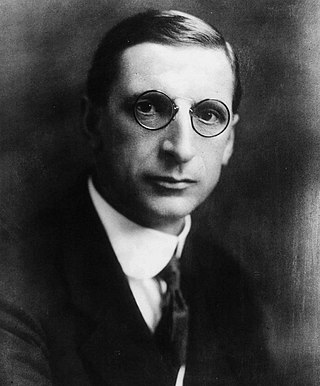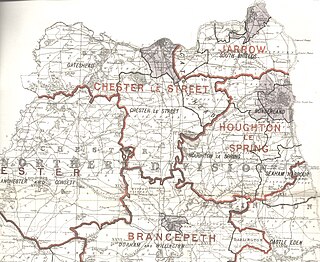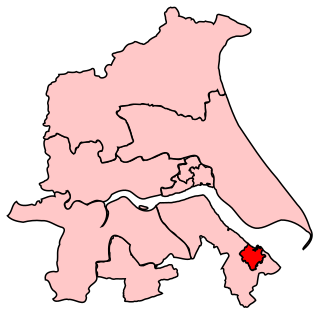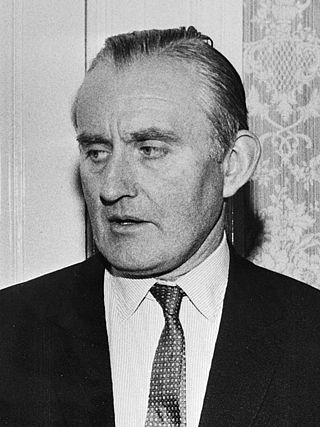Related Research Articles

The 1918 Irish general election was the part of the 1918 United Kingdom general election which took place in Ireland. It is now seen as a key moment in modern Irish history because it saw the overwhelming defeat of the moderate nationalist Irish Parliamentary Party (IPP), which had dominated the Irish political landscape since the 1880s, and a landslide victory for the radical Sinn Féin party. Sinn Féin had never previously stood in a general election, but had won six seats in by-elections in 1917–18. The party had vowed in its manifesto to establish an independent Irish Republic. In Ulster, however, the Unionist Party was the most successful party.

South Down is a parliamentary constituency in the United Kingdom House of Commons. The current MP for the constituency is Chris Hazzard of Sinn Féin.
Liverpool Exchange was a borough constituency within the city of Liverpool in England, centred on Liverpool Exchange railway station. It returned one Member of Parliament (MP) to the House of Commons of the Parliament of the United Kingdom, elected by the first past the post system.
Londonderry City was a parliamentary constituency in northern Ireland. It returned one Member of Parliament (MP) to the United Kingdom House of Commons, elected by the first past the post voting system.

St Stephen's Green, a division of Dublin, was a borough constituency in Ireland. It returned one Member of Parliament (MP) to the United Kingdom House of Commons from 1885 until 1922 on the first past the post electoral system.
Patrick Joseph Brady was Irish nationalist MP in the Parliament of the United Kingdom of Great Britain and Ireland for Dublin St Stephen's Green constituency from 1910 to 1918, during the closing years of the Irish Parliamentary Party’s dominance of Irish politics. Later, he was a Senator of the Irish Free State from 1927 to 1928. He was one of the few parliamentarians who served in both the House of Commons and in the Oireachtas.
Edmund Francis Vesey Knox was an Irish nationalist politician. Initially a member of the Irish Parliamentary Party, he sided with the Anti-Parnellite Irish National Federation majority when the party split in 1891.
The Altrincham by-election was a Parliamentary by-election held on 28 May 1913. The constituency returned one Member of Parliament (MP) to the House of Commons of the United Kingdom, elected by the first past the post voting system.

Richard Hazleton was an Irish nationalist politician of the Irish Parliamentary Party. He was Member of Parliament (MP) for North Galway from 1906 to 1918, taking his seat in the House of Commons of the United Kingdom of Great Britain and Ireland.

The Irish Home Rule movement was a movement that campaigned for self-government for Ireland within the United Kingdom of Great Britain and Ireland. It was the dominant political movement of Irish nationalism from 1870 to the end of World War I.
Patrick George Hamilton Carvill was an Irish Liberal and nationalist politician. He was a Member of Parliament (MP) for Newry from 1892 to 1906, taking his seat as an Irish Parliamentary Party member of the House of Commons of what was then the United Kingdom of Great Britain and Ireland.
Sir James Brown Dougherty, was an Irish clergyman, academic, civil servant and politician.

The North West Durham by-election was a Parliamentary by-election held on 30 January 1914. It returned one Member of Parliament (MP) to the House of Commons of the United Kingdom, elected by the first past the post voting system.

The Great Grimsby by-election was a Parliamentary by-election held on 12 May 1914. The constituency returned one Member of Parliament (MP) to the House of Commons of the United Kingdom, elected by the first past the post voting system. It was one of the last by-election contests to take place before the outbreak of the Great War, and provided a good indicator of how the main parties would have performed at an anticipated general election for 1914 or 1915.
The Midlothian by-election was a Parliamentary by-election held on 10 September 1912. The constituency returned one Member of Parliament (MP) to the House of Commons of the United Kingdom, elected by the first past the post voting system.
The Londonderry City by-election was a Parliamentary by-election held on 30 January 1913. The constituency returned one Member of Parliament (MP) to the House of Commons of the United Kingdom, elected by the first past the post voting system.
David Cleghorn Hogg JP was a Protestant businessman and politician, originally from Scotland, but established resident in Victoria Park, Derry, County Londonderry.

The 1970 United Kingdom general election in Northern Ireland was held on 31 March with 12 MPs elected in single-seat constituencies using first-past-the-post as part of the wider general election in the United Kingdom. It was the first general election held after the Representation of the People Act 1969 which reduced the voting age from 21 to 18.
References
- ↑ Walker, Brian Mercer (1978). Parliamentary Election Results in Ireland, 1801-1922. Dublin: Royal Irish Academy. p. 183. ISBN 0-901714-12-7.
- ↑ Journal of Liberal History 58 Spring 2008 page 10 Archived 2013-10-17 at the Wayback Machine
- ↑ Siege city: the story of Derry and Londonderry by Brian Lacy
- ↑ Debrett's House of Commons 1918 p 249
- Craig, F. W. S. (1974). British parliamentary election results 1885-1918 (1 ed.). London: Macmillan.